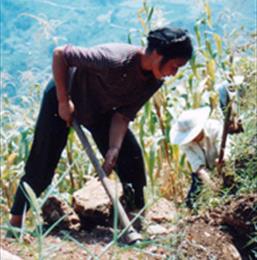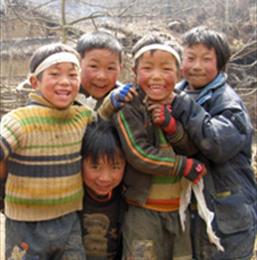Aug/Sept 2003
30th September 2003
Rural Energy
The August-September newsletter will introduce DORS' rural energy projects. Many of the villages DORS works with have a shortage of energy, both electricity and fuel for cooking and space heating. Of the poor remote villagers several are without electricity supply. Only the better-off villagers with road access can buy some coal for cooking, others use fuel-wood. Collecting of fuel-wood is time-consuming and in many places no longer permitted. The first rural energy project, a micro-hydro power station was implemented in 1998 in Banyang Village and since then, DORS has implemented a variety of rural energy projects: such as fuel efficient stoves, installed solar panels, contributed to the 'reconstruction of rural electrical grid' (Nong Wang Gai Zao), planting of fuel wood trees and has also conducting rural energy training.
| Project | Village | Population affected by Project | Funds spent (RMB) |
|---|---|---|---|
| Micro Hydro Electricity Training |
Shashu | 435 | 708 |
| Micro Hydro power | Banyang Hamlet 4 | 48 | 8,000 |
| Electric Generator | Banyang Hamlet 1 | 14 | 15,000 |
| Electric generator | Sugu Hamlet 6 | 57 | 18,000 |
| Electricity Generator | Na' Er | 61 | 5,415 |
| Electricity Transformer | Wanping Hamlet 5, 7 & 14 | 212 | 7,000 |
| Electricity Transformer | Chalin Hamlet 6 | 9 | 1,551 |
| Fuel Efficient Stoves | Huodi | 268 | 13,887 |
| Electricity Transformer | Huodi Hamlet 5 | 40 | 7,636 |
| Solar Panels | Pilot project in Banyang, Sugu, Na'er, Wanfu | 30 | 8,600 |
| Reconstruction of rural electrical grid (incl. 2 solar panels) | Baikun | 106 | 8,912 |
| Reconstruction of rural electrical grid | Zhongpu | 167 | 7,800 |
| Fuel Efficient Stoves | Baikun & Zhongpu (ongoing) | 273 | 52,300 |
| Fuel Efficient Stoves | Teke (ongoing) | 724 | 10,968 |
| Total | 10 villages | 2,444 | 165,777 |
Solar Panel
On an experimental basis, DORS purchased six solar panels to be tried and tested in four different hamlets that were not connected to the grid and unsuitable for hydro-power. First two different models of solar panels were purchased. They were sent to Banyang Village, Hamlet 5, where the teacher Mr Li who had first received instructions on how to install and use the solar panels by the Rural Energy Bureau, trained other Banyang villagers on the use of the solar panels. The solar panels were tried in different households at different times. The feedback received was that the larger model was more popular providing lighting all night, though not really adequate for a television set. The smaller system could light two bulbs for about 3-4 hours. This system was considered not adequate as during winter it would cause a problem with the limited hours of sunlight. After the purchase of four other solar panel systems, Mr Li then trained other villagers from two other villages to use the solar panels. The feedback was more positive. The solar panels cost around 1600 RMB each, and although DORS offered to cover 2/3 of the cost, the villagers were not willing to contribute the remainder, therefore we did not expand the pilot project. One reason why people were unwilling to contribute was that they aspire to having electricity to power a television in addition to lighting, which these solar panels cannot provide. The pilot project is still running and we are awaiting further feedback before making a final assessment
Fuel Efficient Stoves
Huodi Village-Nimei Township
Many of the more remote villages have a shortage of fuel-wood. The villagers in Huodi Village mentioned that it takes them several months each year to collect fuel wood from forest land up the valley. Traditionally the Yi people have a fire on the floor of the main room of their house, this fire is used for cooking and heating. The fire is in a small pit and there is a metal frame or three stones to rest a pot on. There is no chimney so smoke fills the room. The first proposal for a fuel-efficient stoves project was received by Huodi Village in Nimei Township. DORS requested assistance from the Rural Energy Office. They have stove designs that are suited to the stove uses in Hanyuan, and can been made of locally available materials. The Rural Energy Office arranged for an engineer to visit Huodi and discuss the new design with villagers. Two demonstration stoves were built. After experiments showed a significant saving in fuel, the villagers prepared a namelist of households interested in building a stove.
The villagers made a contribution of 50 RMB per stove. DORS also requested that the villagers signed a simple agreement saying they would provide labour and only start construction after that had prepared all the materials. DORS paid for two engineer to train villagers in stove construction and oversee the building of all the stoves in the village. The skilled shaping of the inner chamber and selection of suitably sized materials also had to be closely supervised by the experts. The villagers were particularly enthusiastic about the new stoves. The stoves are cleaner as there is a chimney so the room does not fill with smoke, and the stove top is covered in tiles, so there is a clean working surface for food preparation. This is much more hygienic than the previously cement or mud brick surface. The villagers all said they were using half the fuel previously used and were pleased with the functioning of the new stove. Having seen many built, they have enough skill in the village now to rebuild or repair their stoves. The villagers have now experience in working with cement and bricks, tiles, mixing materials and other skills which will be useful to them when looking for labouring work, or rebuilding their own houses.
Mr Bai, who now works full time with DORS on technical projects, builds demonstrations stoves for the other fuel-short villages, trains local people in construction and is available for advice on the construction. This helps to leave the technology and skills in the village after DORS departure.
Reconstruction of rural electrical grid
Zhongpu Village and Baikun Village, Lianghe Township
The electricity project was undertaken at the request of the villages, to replace an aged electricity system, built in 1974, which had fallen into disrepair. The former was owned and maintained by the villagers. The Ganluo Water Conservancy Bureau drew plans for the proposed electricity project, and after consulting with the Electricity Company, a cost was estimated. DORS staff approached the relevant local officials, who agreed to include the two villages onto the Nong Wang Gai Zao scheme (a government-sponsored scheme to connect rural villages onto the central electricity grid). The scheme provides most of the funds, but requires a total contribution of RMB 130 from each household to be connected. DORS helped the villagers to cover the cost by agreeing to pay RMB 100 of that sum. The households then contributed RMB 30 each.
As this project is a government scheme, it was implemented by workers from outside the village. Two households in Baikun were too far removed from the main village, and so it would have been impractical to connect them to the grid. In order that they might not be excluded, two solar panels generators were purchased. The electricity project has given the villagers a safe and reliable electricity supply. Some of the households that originally had no electricity supply have experienced a huge improvement in living standards as a result. Such villagers are now able to arrange their daily tasks without the restriction of the hours of darkness. Now all the power masts have been put in place, there is the potential to use machines such as grinders for grain and fodder.
Micro-hydro power stations
The aim of this project is to assist a natural village in the design and purchase of materials for a hydropower generator or transformer to supply adequate and stable domestic electricity supply to the households. The supply we provide is to be equally available to all households, with as far as possible none excluded by reason of poverty, remoteness or other exceptional difficulties.
The water source used is normally a mountain stream, and part of the water is channelled into a water storage tank, from where piping takes the water down a hillside into a small building containing the generator. From the generator, electrical wires connect the houses to the supply.
A series of meetings are held in the village over a number of weeks prior to the start of the project, where the merits of both hydropower/transformer schemes and other options are discussed. Engineers from local government departments are invited to provide technical input and outline plans at appropriate junctures in the decision making process. An agreement is then drawn up between the villagers and DORS for the project, specifying how it should be carried out, and making clear each stakeholders' responsibilities. The DORS contribution is made directly to the village's representatives who make the purchases and arrange for the construction work. The skilled technical work for the project, such as the installation of the generator is carried out by technicians from Hanyuan or Ganluo County's electricity supply board or the County's agricultural machine department, whilst the villagers provide the manual labour themselves, including local transport, building the generator/transformer house, and erecting the concrete poles to support the power lines.
To ensure the immediate and long-term safety of the project, the villagers attend a safety lecture held by the electricity board. One person is also chosen by the villagers to be the person responsible to maintain contact with the Electricity Board to address issues (safety, repair, maintenance, etc) that would need to be attended to. The same person is responsible to collect the monthly bills.
DORS News and Information
Bai Shi Hai, DORS Engineer, went for a construction training in Yun Jing, Ya'an District, to be a certified senior engineer. Mr Bai had three days of training in construction of sanitation system and was given a certificate issued by the State Construction Department.
Rita Bonomally, Office Manager/Project Officer attended the China Microfinance Summit in Beijing, organised by the Rural Development Institute - Chinese Academy of Social Sciences.


